Upsetting Day: The Horror Movie Hidden in St. Elmo's Fire (Patreon)
Content
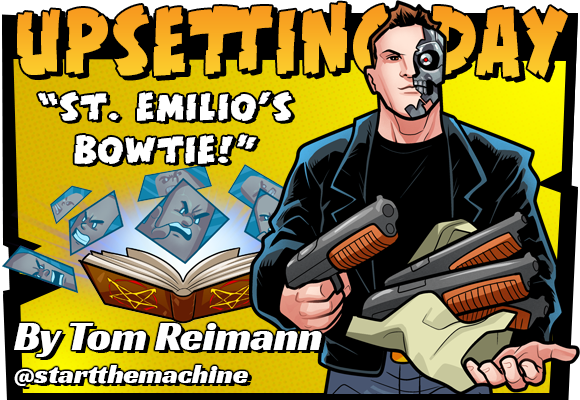
For a brief period in the 1980s, American cinema was very worried about yuppies. Specifically, whether or not yuppies were happy. If you didn’t grow up in the 1980s or have never watched a stand-up special where the comedian is wearing a blazer and standing in front of a brick wall, you might not be familiar with the word “yuppies,” a catchy half-nickname, half-acronym meaning “young upwardly mobile professionals.” America was also very concerned with branding in the 1980s. It was the decade of M.A.S.K., and A.L.F., and Reagan, which by mere association must also be an acronym, although I don’t know what it stands for. Maybe: Really Elderly Actor Going, “AIDS? Nope.”
Basically, yuppies were young suburban kids who were either destined to graduate into respectable, well-paying jobs, or had already graduated into those jobs years ago. In either case, they were simply crippled with ennui, helpless prisoners of their own privilege and success, and the rest of the world just didn’t understand. You and I are supposed to care deeply about this. We are supposed to be so wrapped up in whether or not these yuppies will finally be content that we feel genuine outrage and sympathy when they are faced with extremely basic life challenges, such as suffering an actual consequence. And apparently we were! They made an alarming number of these! 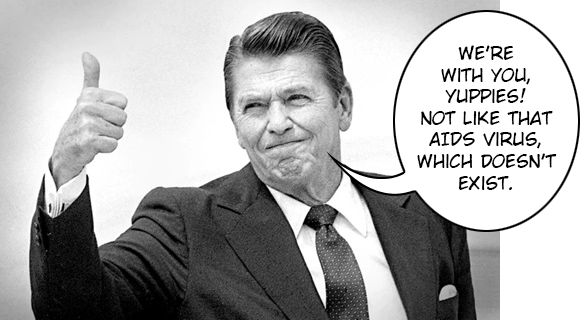
The mother hydra of yuppie ennui movies is The Breakfast Club. You are free to disagree, but please understand that you are wrong. The Breakfast Club is about a group of moody apprentice yuppies who all meet at school for the same Saturday detention to complain about their gilded cages to John Bender, a teenager who is genuinely living a difficult life.
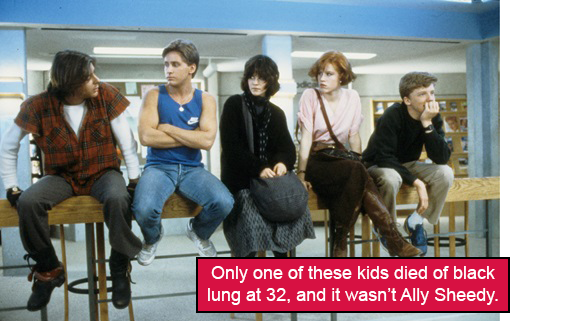
I’ve seen The Breakfast Club several times, because I was a teenager between the years 1985 and 1999, and those are the rules. Something that’s always bugged me about The Breakfast Club is that it ends with four of the characters in couples, leaving the nerdy kid the literal fifth wheel, and that sucks because they also make him write the report. Since each kid gets sweet on someone from the opposite clique (the burnout falls for the princess and the artist locks lips with the jock), the nerd should’ve ended up with the dumbest kid in school. Just the muddiest bag of hammers in his study hall. Someone conjure John Hughes’ spirit from the afterlife so he can fix that. Or I guess we could just do it with computers. Computers haunted by John Hughes. But back to my point - It is from the vine of The Breakfast Club that the bitter fruit of St. Elmo’s Fire was born.
St. Elmo’s Fire is a 1985 Joel Schumacher film following six, or seven, or possibly even five different yuppies as they graduate Georgetown University and head out into the real world to collect the careers that have been promised them. Everyone has sex with each other for two hours, except for Emilio Estevez, who has sex with no one, and Demi Moore, who has sex with an old man. She tries to kill herself at the end of the film by leaving all of her apartment windows open. The movie treats this as though she is juggling cobras on the precipice of the Space Needle. She was extremely distraught over that old man; maybe he fucks like a jackhammer. A withered old jackhammer with too many skin folds. Anyway, that’s the whole movie. I’ll circle back to Emilio in a minute.
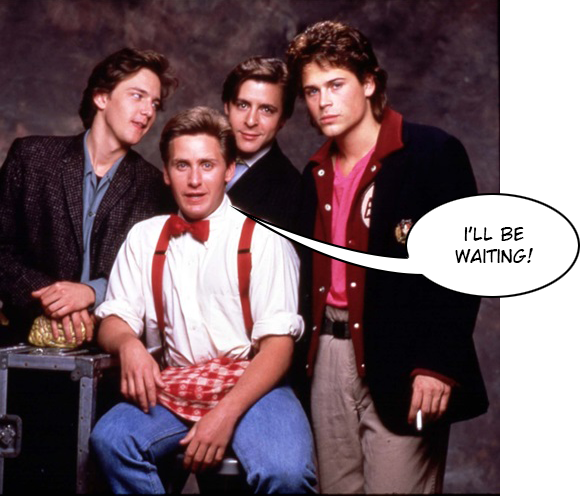
St. Elmo’s Fire stands out amidst the noise of all the other Brat Pack movies of the 80s like The Breakfast Club, Pretty in Pink, Sixteen Candles, and Some Kind of Wonderful because unlike those movies, I can’t picture anyone watching it. It’s an image my brain will simply not allow, like a V-chip protecting me from psychic damage. And I’m not just saying that the movie is bad in 2023, far removed from whatever box office spell was cast by yuppie tears back in the Brat Pack’s heyday. St. Elmo’s Fire is bad even for a yuppie ennui movie. It’s so preoccupied with being edgy and real that it forgot to make any of its characters likable, or interesting. They’re so focused on navel-gazing speeches lamenting the fact that none of them are millionaires at age 22 that a movie never materializes around them. There are only two characters in the film that make enough of an impact for me to write about, and all of those words should be contained within a police report. It’s not a positive impact, is what I’m saying.
Rob Lowe plays Billy, although his character should be named Sex Poodle, because he has the hair of a prize show dog and he plays the saxophone with wetter pelvic gyrations than the subject of a federal wiretap. He tries to sexually assault two of his closest friends and is instantly forgiven, only to abandon the whole group at the end of the film to go play his saxophone in New York. We are meant to be sad to see him leave, as though this is the closing of an important chapter in all of their lives. In reality, he has merely moved on to terrorize the next city, like Godzilla.
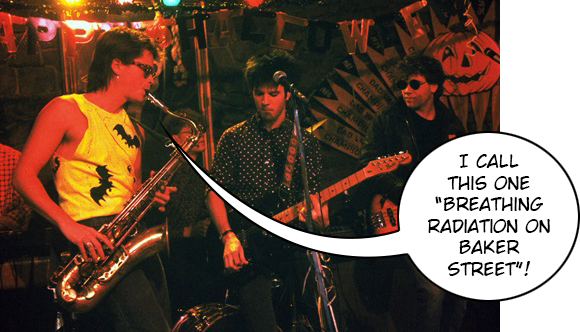
Billy is a great distillation of the movie’s central theme, which appears to be: “Menacing women is totally understandable, and sometimes cute, if you’re a moody yuppie just trying to figure things out.” But in this regard, Billy can’t hold sixteen candles to the moodiest yuppie of all - Kirby “Kirbo” Keager, played with the shark-like intensity of the Boston Strangler by Emilio Estevez.
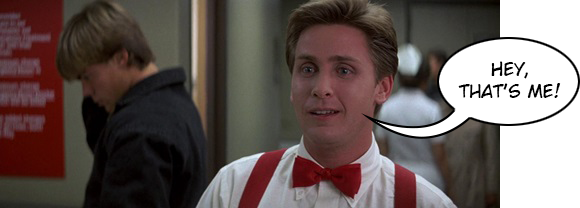
Kirby is the star of the film’s B story, in which he relentlessly stalks a woman named Dale Biberman, an ER doctor he took on a single date back in college. Dale is played by Andie MacDowell, in an early showcase of that intangible movie star quality that can only be described as “being noticeably several inches taller than Emilio Estevez.” I point this out because it will provide the only source of levity in their many excruciating scenes together.
Listen, we have fun here. It’s right there in the website’s name - you can’t have a frown on your face when the word “HOTDOG” is gently hovering in your peripheral vision at all times, like a polite ghost. However, please understand that it is not a joke or even a humorous exaggeration when I say that Emilio Estevez spends the entirety of St. Elmo’s Fire establishing premeditation for an inevitable murder. The movie thinks Kirby’s hopeless obsession is a gold mine of awkward rom-com jokes, but Estevez plays it like a psychological thriller. It’s like deleting Ben Stiller from There’s Something About Mary and replacing him with Max Cady. Or Brett Favre.
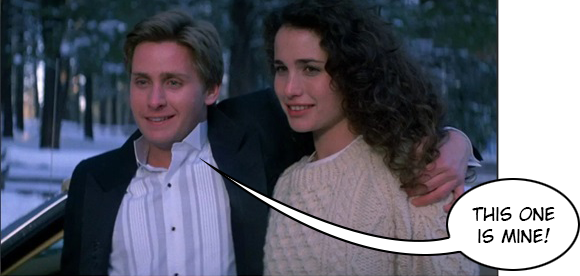
Joel Schumacher was a talented madman, so part of me wonders whether Kirby’s story was a deliberate piece of commentary on yuppies and white suburban culture in general. You could argue that Kirby is meant to represent what happens when young men raised on a steady diet of media about “nice guys getting the girl” grow up to become narcissists who believe they are owed a woman’s attention. It would fit the movie’s overall theme of being spoiled by the promises your parents made about your future. That’s the kind of chaotic spirit that put nipples on the Batsuit. Sweet, pinchable nipples. But when you watch St. Elmo’s Fire, Kirby’s storyline never feels anything but earnest. There’s no intent behind his escalating harassment except brutally uncomfortable situations that are played for laughs. He’s presented as a hopeless romantic, but he has all the charm of a flesh-eating beetle.
Kirby first runs into Dale in the emergency room, after Sex Poodle drunkenly crashes a friend’s car. Kirby is in law school, so he struggles to convince the cops to let Rob Lowe off the hook in order to look like a big shot in front of Dale. Unfortunately for Kirby, he works at St. Elmo’s Bar, an establishment that makes all of its servers dress like the happiest elf at Oktoberfest. It’s difficult to impress women, law enforcement, or women in law enforcement while wearing that outfit. Also, Kirby has only been in school for a few months, so he doesn’t know anything about the legal system, and he can’t bluff his way through it because John Grisham movies haven’t been invented yet. The cop is thoroughly unimpressed, and Sex Poodle is granted the DUI he deserves.
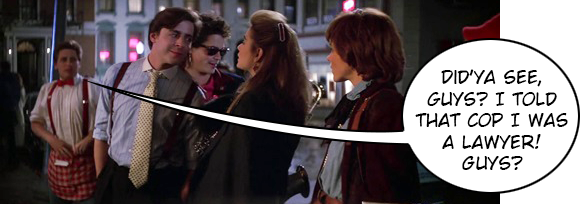
After completely failing to keep his friend out of jail, Kirby marches back inside the hospital to invite Dale to dinner, while wearing a bow tie. That’s like trying to do a magic trick and shitting on your hands. Kirby is hitting on a serious professional in the middle of the hospital’s emergency rush while dressed like Santa’s mightiest elf. He looks like the most rambunctious scamp at the knickerbocker factory. He looks like an inventor.
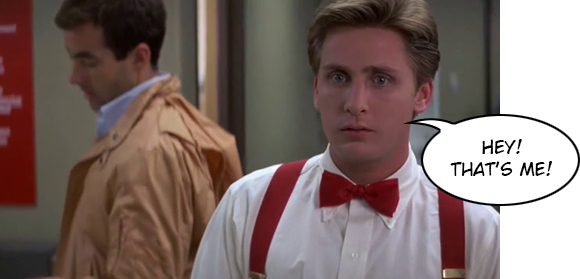
Kirbo met Dale Biberman in college and took her to a movie. Judging by his bow tie and his reptilian charisma, we can assume it was not a good movie. Also, “Dale Biberman” sounds like the name of a character we never meet on Seinfeld. That sentence made sense when I typed it, so it’s staying in. We also see that Kirby is obsessed with Woody Allen. He has several giant Woody Allen posters hanging in the apartment he shares with a listless Andrew McCarthy, including one just of Woody’s face. Things are already looking grim for Dale Biberman.
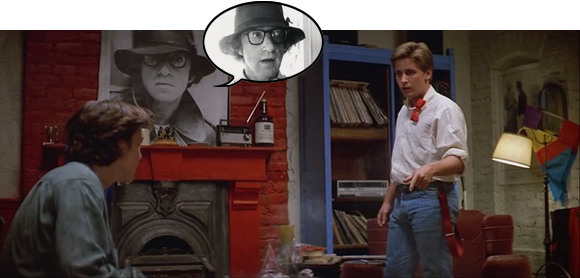
As the movie’s primary story continues without him, Kirby’s obsession quickly escalates. He copies down Dale’s hospital schedule so he can more effectively harass her at work, and then drops out of law school to enroll in medical school, so he can be a doctor just like her. At this point I feel like I need to pause to reiterate that the movie treats this as endearing. We are supposed to like Kirby, rather than find ourselves writhing in fear’s icy grasp every time we make eye contact with his cursed image.
Kirbo invites Dale to lunch at a fancy restaurant, and has Demi Moore instruct him over the phone on what wine to order and how to smell the cork in order to trick Dale into thinking he has some kind of taste. During the meal, he quotes Annie Hall at her, because it’s the movie they went to see on their date, because of course it was. But he gets furious when she doesn’t recognize the quote, and can’t remember what movie they saw. This is a bigger red flag than a guy hitting on you in the emergency room while dressed like a toymaker. It’s the kind of red flag you use to communicate major nautical catastrophes. Kirby waits outside the hospital to follow her, on his bike, in the rain. He trails her to some kind of mansion party, maybe an Eyes Wide Shut situation, and spies on her through the window for an uncomfortably long time.
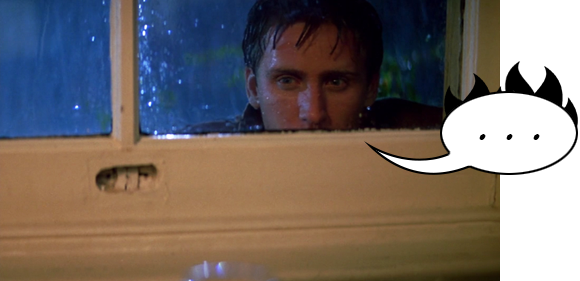
Then he staggers inside, soaked to the bone, sucking gasps from the room like an embarrassment vampire. He marches up to Dale and hisses, “I’m obsessed with you.” Ooh, do we hear wedding bells?! Dale takes Kirby home with her after this display, for some insane reason. She leaves him alone for a few seconds, and the first thing he does is cram his face into her pillow and breathe deep.
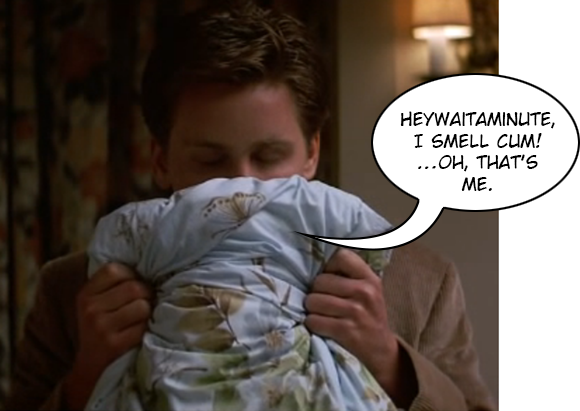
He goes maximum creep the instant he’s given the opportunity. Just sniffs her pillow like a real rat king. But the movie treats this like it’s funny, and kind of cute; Dale’s roommate catches him snortin’ his honker all over her pillow and her eyes get real wide like she just heard Death whisper His deafening name, and Kirby mugs sheepishly like we’re sharing a cheeky bit of aw-shucks awkwardness. As though Kirby is a hopeless romantic, rather than a man who desperately needs to be maced until his eyes drain out of his skull.
Dale returns and they have a conversation, which is another way of saying that Dale speaks while Kirby vibrates like he’s stuffed with angry cockroaches. She opens up to him and admits that she’s disillusioned with her career as a doctor because it feels like health care is all about the money. Kirby doesn’t hear any of this except for the word “money,” because he is not actually interested in Dale as a person or in anything she has to say. He hulks out and concludes that she has insulted him for being “poor,” although most poor people don’t live in a 2-bedroom apartment in Georgetown while attending law school. Then he storms out of her apartment to pedal back home to his Woody Allen posters like the Zodiac killer.
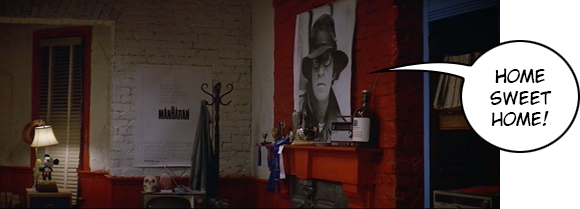
After licking his wounds, Kirby levels up his stalking by getting a job with a frightening businessman, and forcing the company chauffeur to drive him to Dale’s hospital so he can wait around in the parking lot until she happens to walk by. (Kirby has nothing else going on during his weekdays.) He has the driver open the door for him so he can leap out of the car like a visibly erect jack-in-the-box and ambush Dale. After sweatily telling her about his new job as fast as he can, like a kid trying to buy cigarettes, he shows her a copy of USA Today with an article about his new employer to prove he didn’t make the guy up. Because ambushing your crush with proof of life for your boss is a guaranteed panty-dropper. In any other movie, this scene would end in a kidnapping.
I feel like I don’t even need to say it, but Kirby has no intention of hanging on to this job. The second his new boss goes out of town, he throws a huge party at the boss’ business mansion, just so he can invite Dale and dazzle her with riches. To recap, Kirby abandoned his law degree, enrolled in medical school, dropped out of medical school, got a job working for a powerful man, then broke into that man’s house to throw a party for a woman he knows nothing about. If stalking were an Olympic event, Kirby would have skin masks of all the judges’ faces.
But what’s this - Dale doesn’t show up?! Kirbo calls the hospital and freaks the fuck out. Just has an absolute meltdown. He gets Dale’s private number and tries to have the operator force his call through. And when that doesn’t work, he takes his friend’s car and drives to Dale’s apartment to stand in front of her door and scream at the building like an absolute maniac while hammering the doorbell. Again, we are supposed to like Kirby.
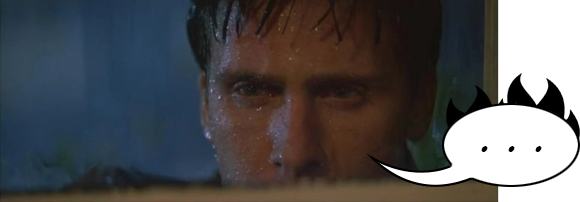
Dale’s roommate pokes her head out the window - wisely deciding not to come down to the door - and tells him Dale went on a ski trip. Perhaps remembering the terrifying pillow-sniffing secret they both share, Kirby threatens the roommate to reveal exactly where Dale is. He actually says, “I can’t be responsible for what I’ll do to you if you don’t.” It’s weird that I need to keep reminding you that we’re supposed to be rooting for this character, and yet here we are. Kirby then drives hours through the snow to Dale’s cabin and begins pounding on the door in the middle of the night like a cautionary tale about the dangers of smiling at men in bow ties.
Kirby finds Dale there with her boyfriend and flips out. He attempts to make a dramatic display of righteously storming off in the face of her betrayal (again, they went on a single date, four years ago) only to fall down in the snow and ruin his tuxedo. He pouts in his car - which is actually his friend’s car, and which he has managed to get stuck in a snowbank - until Dale convinces him to come inside so he doesn’t freeze to death with a stupid look on his face like Jack Nicholson in The Shining. Dale convinces him to stay the night until his extra-large child’s tuxedo is dry, and lends him a pair of her boyfriend’s pajamas. Kirby continues to be a weird lunatic and says petulant things like, “Oh, you want me to wear his pajamas?” For reasons that will remain forever shrouded in mystery, like the tomb of a forgotten king, Dale turns her back on Kirby and goes to sleep while he is still inside the cabin. Miraculously, she and her boyfriend wake up the following morning.
Dale sends Kirby home, but not before inexplicably telling him, “I really don’t know you, but you seem like a fine person, and I’m sure deep down I’ll always wonder whether this is my loss.” Then she kisses him on the cheek, because this movie was written by either a Martian or a psychopath. Kirby’s reptilian instincts sense that this is his moment to strike. He grabs Dale and spins her around into a dip kiss, which must have looked awkward from far away, because she is normal sized and he is a Pop figurine. I believe he stood in the passenger seat to pull this off.
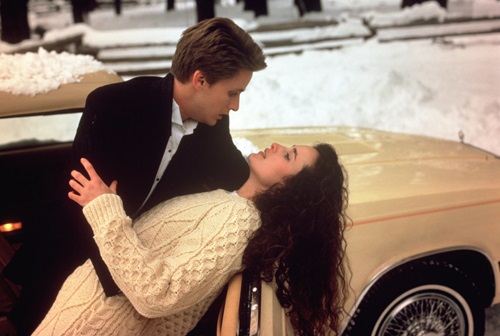
Her boyfriend returns to take a photograph of them both together, in case she ever goes missing. Kirby smiles and laughs, then hops into his borrowed vehicle and drives off towards the sunrise, pumping his fist in the air.
Up to this point in the movie, Kirby’s only goal in life was to impress Dale and make her his girlfriend/landlord. But his victorious reaction suggests being utterly rejected like a gifted magazine subscription was his goal all along. A generous interpretation of the scene could be that Kirby is taking Dale’s unreasonably courteous rejection as an admission that she would be putty in his hands, had she not already pledged her love to another. But he ruined his life to get that admission. It doesn’t make sense for him to be this psyched about it, although I’m grateful he is, because in real life this would’ve ended in a murder-suicide. Joel Schumacher’s next film, The Lost Boys, was a much more coherent statement about youth culture. Plus it has vampires in it.
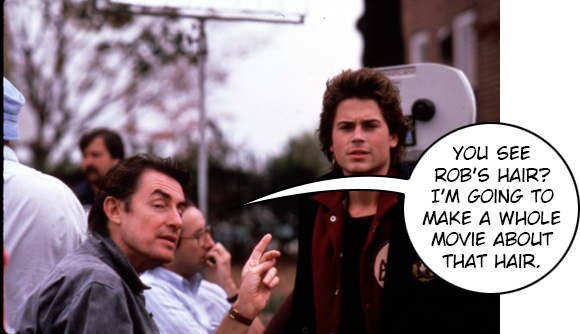
Tom Reimann is the co-founder of the podcast and streaming network Gamefully Unemployed, where he is currently accepting donations for disillusioned yuppies.

This article was brought to you by our fine sponsor and Hot Dog Supreme: Clementine Danger the Rob Lowe's hair (1985-1989) of hot dog enthusiasts.
You can read this article and every other one on the much better in every way 1900HOTDOG.COM.
